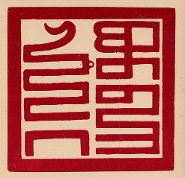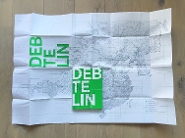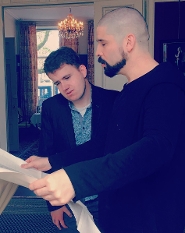
Immersed in Manchu
Fresco Sam-Sin teaches the almost extinct language Manchu. His appointment one day in the week is no match for his enthusiasm. But that doesn't stop him. He is also involved in exporting his online translation platform into other languages and other countries.
Fifteen students
Manchu originates from Siberia, the present far north-east of China. There are very few speakers of the language and it was even thought to be dead. 'But then a couple of toothless old ladies appeared out ot the mountain areas who still spoke it,' San-Sin explained. Although pretty close, the language isn't yet completely stone dead. Manchu is related to Mongolian and Turkish. The script is vertical and has been taken from the Mongolian alphabet. Sam-Sin breathed new life into the language as part of the programme in Chinese: he now has a group of fifteen students who are just as driven as he is.
Concrete product important

With the help of a platform that Sam-Sin developed himself, the students translate under his supervision fragments from the four million documents that exist in Manchu. This takes place outside the lectures so that he can spend time on other aspects. 'It works really well,' he commented. Sam-Sin managed to get the money together via crowdfunding to make an attractive and well-designed magazine. 'I believe your work has to deliver something concrete, a product that you can see and hold in your hands.' The name of the magazine is Debtelin, which means 'little book' in Manchu. As it is more like a book than a magazine, the name is very appropriate.
Special dustcover

Each magaziine in the series will have a specific theme. The theme of the first number is 'En route' and it contains passages translated into Dutch of letters from travellers and travel diaries. The dustcover is made up of a large folded map that shows the journeys made by the travellers: an emperor, a soldier and a forced emigrant. The circulation is currently 200 and it costs 26.50 euros. Sam-Sin wants to change the translation to English rather than Dutch, which will increase the readership. He has already decided the themes for the coming two editions: archery and shamans. Archery (on horseback) was one of the mainstays of the Manchu identity, and female (!) shamans were not only important religious, but also important political figures.
Qing dynasty

That there at least four million documents in Manchu is not so surprising: the Manchus, initially a mishmash of diverse cultural groups with almost no identity of their own, overran Peking in 1644 bringing the Ming dynasty to an end. The reign of the Qing dynasty would last until 1911. Most official documents were written in Manchu and Chinese. There are also a large number of texts that were only written in Manchu. It is this last category that gives a surprising and intimate picture of the Manchu dynasty, see the travel accounts. Spoken Manchu gradually disappeared, and it increasingly became a kind of secret language beside the main language Chinese. 'The Manchus knew Chinese because they had many Chinese slaves,' according to Sam-Sin. When the Qing dynasty came to an end, there was hardly anyone left who still spoke Manchu.
Vertical script
The choice in favour of Manchu was a form of escapism, Sam-Sin confesses. 'My husbank studied classical languages. That was very relaxed because he didn't have to keep up with all kinds of linguistic developments. I wanted to do something similar.' So he specialised in Manchu in his Chinese programme, not knowing that he would become so fascinated by it. And it is indeed special: there are just a few dozen people in the world who can read Manchu.
Funds to expand
Sam-Sin opened his platform to students abroad, in London and Tübingen, for example, where Manchu is also taught. He is now expecting funding from Tübingen to broaden his platform further. Other small languages are also interested in the platform. At Leiden University Sam-Sin also heads the DigiTaalkit for ECOLe, the expertise centre for Online learning. ‘I am now going to adapt the programme for cuneiform Hittite.' It's not only Sam-Sin's enthusiasm that is contagious; his work is, too.
(CH)
